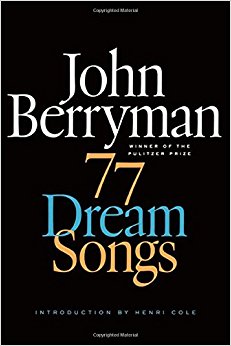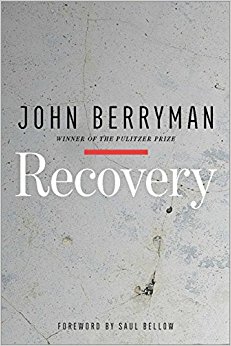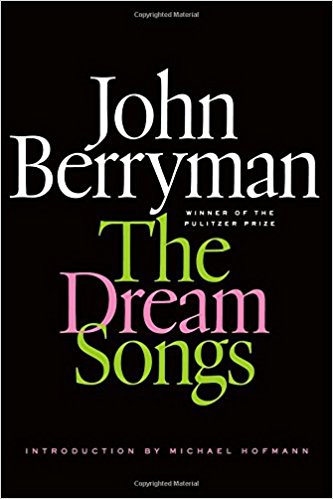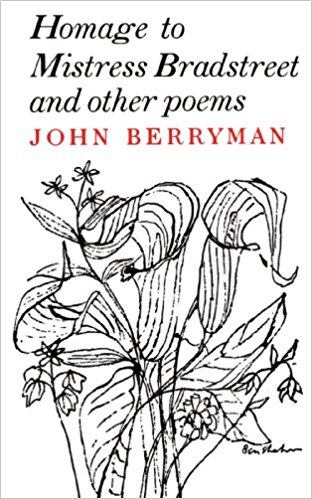Background
John Berryman was born John Allyn Smith, Jr. in Oklahoma where he was raised until the age of 10, when his father, John Smith, a banker, and his mother, Martha, a schoolteacher, moved to Tampa, Florida.

John Allyn McAlpin Berryman

(This volume brings together all of Berryman's poetry, exc...)
This volume brings together all of Berryman's poetry, except for his epic The Dream Songs, ranging from his earliest unpublished poem (1934) to those written in the last months of his life (1972). A definitive edition of one of America's most distinguished poets.
http://www.amazon.com/gp/product/0374522812/?tag=2022091-20

(A wild, masterful Pulitzer Prize-winning cycle of poems t...)
A wild, masterful Pulitzer Prize-winning cycle of poems that half a century later still shocks and astounds John Berryman was hardly unknown when he published 77 Dream Songs, but the volume was, nevertheless, a shock and a revelation. A "spooky" collection in the words of Robert Lowell-"a maddening work of genius." As Henri Cole notes in his elegant, perceptive introduction, Berryman had discovered "a looser style that mixed high and low dictions with a strange syntax." Berryman had also discovered his most enduring alter ego, a paranoid, passionate, depressed, drunk, irrepressible antihero named Henry or, sometimes, Mr. Bones: "We touch at certain points," Berryman claimed, of Henry, "But I am an actual human being." Henry may not be real, but he comes alive on the page. And while the most famous of the Dream Songs begins, "Life, friends, is boring," these poems never are. Henry lusts: seeing a woman "Filling her compact & delicious body / with chicken páprika" he can barely restrain himself: "only the fact of her husband & four other people / kept me from springing on her." Henry despairs: "All the world like a woolen lover / once did seem on Henry's side. / Then came a departure." Henry, afraid of his own violent urges, consoles himself: "Nobody is ever missing." 77 Dream Songs won the Pulitzer Prize in 1965, but Berryman's formal and emotional innovations-he cracks the language open, creates a new idiom in which to express eternal feelings-remain as alive and immediate today as ever.
http://www.amazon.com/gp/product/0374534527/?tag=2022091-20

(A thinly-veiled autobiographical novel, Recovery follows ...)
A thinly-veiled autobiographical novel, Recovery follows Dr. Alan Severance through his emotional journey of Freudian group analysis where he confesses his humiliations, defeats, and delusions in an attempt to purge himself and achieve normality. A thinly-veiled autobiographical novel, Recovery follows Dr. Alan Severance through his emotional journey of Freudian group analysis where he confesses his humiliations, defeats, and delusions in an attempt to purge himself and achieve normality.
http://www.amazon.com/gp/product/1517901316/?tag=2022091-20

(The complete Dream Songs-hypnotic, seductive, masterful-a...)
The complete Dream Songs-hypnotic, seductive, masterful-as thrilling to read now as they ever were John Berryman's Dream Songs are perhaps the funniest, saddest, most intricately wrought cycle of poems by an American in the twentieth century. They are also, more simply, the vibrantly sketched adventures of a uniquely American antihero named Henry. Henry falls in and out of love, and is in and out of the hospital; he sings of joy and desire, and of beings at odds with the world. He is lustful; he is depressed. And while Henry is breaking down and cracking up and patching himself together again, Berryman is doing the same thing to the English language, crafting electric verses that defy grammar but resound with an intuitive truth: "if he had a hundred years," Henry despairs in "Dream Song 29," "& more, & weeping, sleepless, in all them time / Henry could not make good." This volume collects both 77 Dream Songs, which won Berryman the Pulitzer Prize in 1965, and their continuation, His Toy, His Dream, His Rest, which was awarded the National Book Award and the Bollingen Prize in 1969. The Dream Songs are witty and wild, an account of madness shot through with searing insight, winking word play, and moments of pure, soaring elation. This is a brilliantly sustained and profoundly moving performance that has not yet-and may never be-equaled.
http://www.amazon.com/gp/product/0374534551/?tag=2022091-20

(This volume represents the first appearance in paperback ...)
This volume represents the first appearance in paperback of one of America's most outstanding poets, John Berryman. It contains, besides the long title poem, Homage to Mistress Bradstreet, the major portion of Short Poems; a selection from The Dispossessed, which drew on two earlier collections; some poems from His Thought Made Pockets & The Plane Buckt; and one poem from Sonnets. "It seems to me the most distinguished long poem by an American since The Waste Land." - Edmund Wilson
http://www.amazon.com/gp/product/0374506604/?tag=2022091-20
John Berryman was born John Allyn Smith, Jr. in Oklahoma where he was raised until the age of 10, when his father, John Smith, a banker, and his mother, Martha, a schoolteacher, moved to Tampa, Florida.
Berryman's stepfather sent him to a private school in Connecticut (South Kent School).Berryman went on to graduate from Columbia College in 1936. He also studied overseas at Clare College, Cambridge, on a Kellett Fellowship, awarded by Columbia He graduated from Columbia University, 1936; B.A.,after Clare College, Cambridge, 1938, also Master of Arts, in 1968; Rockefeller fellow humanities, 1944-46; Hodder fellow Princeton, 1950-51; Guggenheim fellow, 1952-53;
In 1940, John Allyn McAlpin Berryman accepted a teaching position at Harvard University, and his first poems were published, along with works by Mary Barnard, Randall Jarrell, W. R. Moses, and George Marion O'Donnell in the collection, Five Young American Poets. For part of 1943, he taught Latin and English at a prep school.
John Allyn McAlpin Berryman was appointed to teach again in 1946. By the mid-1940, he had also earned a reputation for his heavy drinking, womanizing, and unpredictable temperament that could shift from endearing to intimidating.
Berryman's work, Homage to Mistress Bradstreet, which he began in 1948, was first published in 1953 in the Partisan Review, and then in book form in 1956. The poem is based on the life of the seventeenth-century American poet, Anne Bradstreet. The poet summons forth Bradstreet and then proceeds to fall in love with her.
The long poem contains 57 stanzas of eight rhymed lines and is divided into five sections: Berryman's invocation of Bradstreet, a Bradstreet monologue, a dialogue between the two poets, another Bradstreet monologue, and finally a peroration by Berryman.
Homage to Mistress Bradstreet received high praise from critics, who hailed it as Berryman's most mature work to date, a successful attempt at the poetic style of The Dispossessed.
Other critics, however, thought it to be an important and noteworthy work.
He wrote on Christopher Marlowe, Monk Lewis, Walt Whitman, Theodore Dreiser, and Saul Bellow.
Although Berryman's poetry writing and his teaching career were flourishing, his obsession with self-examination, growing dependence on alcohol, and notorious womanizing were putting a strain on his personal life.
In the fall of 1953, after ten years of marriage, his first wife left him. In the spring of 1954, he taught at the Writers' Workshop at the University of Iowa, then spent the following summer at Harvard.
He returned to the University of Iowa in the fall, but was forced to resign after spending a night in jail.
Returning home intoxicated one night, he could not find his key and attempted to force his way into the house.
The landlord's wife called the police and Berryman was charged with disorderly conduct.
He resigned two days later.
In 1955, Allan Tate, a poet Berryman deeply admired, invited him to the University of Minnesota.
This would be Berryman's home for the rest of his life.
At the University of Minnesota Berryman became extremely interested in dream analysis, which he studied in-depth and which subsequently led to his greatest work, The Dream Songs (1969).
In 1957, Berryman was promoted to associate professor and participated in a State Department sponsored lecture tour to India.
John Allyn McAlpin Berryman was awarded the National Book Award, Pulitzer Prize for Poetry, Bollingen Prize.
(A wild, masterful Pulitzer Prize-winning cycle of poems t...)
(This volume brings together all of Berryman's poetry, exc...)
(Thirty-six essays by John Berryman regarding those poets ...)
(Last book of poems which was published after Berryman's d...)
(A thinly-veiled autobiographical novel, Recovery follows ...)
(The complete Dream Songs-hypnotic, seductive, masterful-a...)
(This volume represents the first appearance in paperback ...)
